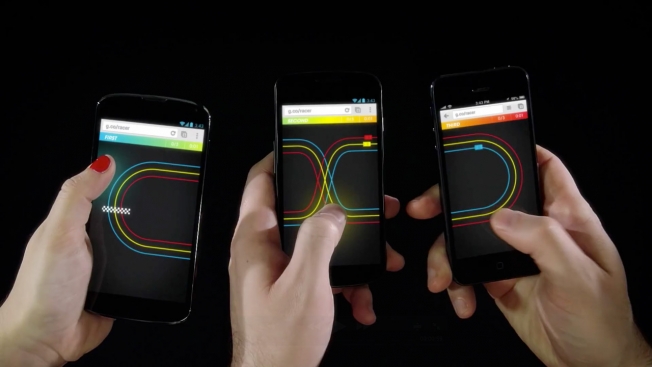
Visiting the video arcade at my neighborhood mall in the '80s was both exhilarating and a bit scary. On the one hand, I feared that bigger kids would try to take all my change. (And I mean a physical shakedown, so quarters would spill from my pockets onto the pizza-smeared floor.) The adrenaline rush came from the games themselves. Asteroids, Space Invaders, Radar Scope ... I loved them all. As I played, I rarely paid attention to my score. I just grooved on the sights and sounds, thrilled to each synthesized pop! bleep! and ping!, riding waves of pixelated excitement for hours on end. I wanted to meld with those machines and live in that world. Magic machines everywhere! That's what I wanted the future to be like. That was a scary thought, too, but no less wonderful for that.
Fast forward to Google's latest Chrome Experiments—two games designed to show off the advanced capabilities of the company's browser. They took me back to those arcades of my youth in ways both good and bad. This is partly because the games, "Roll It" and "Racer," are self-consciously retro. (The latter's soundtrack is by Giorgio Moroder, still taking his passion and making it happen after all this time!) Despite the nods to yesteryear, both games are cutting edge and let users play across multiple screens—phones, tablets and computers. "Racer" lets you drive a car across as many as five mobile devices. Watch it speed from the phone you're holding to the tablet in your buddy's hand! With "Roll It," you control the trajectory of a virtual skeeball on a desktop or laptop screen by moving a smartphone handset this way and that.
"Racer" and "Roll It" are both fun and absorbing—impressive slices of techno-magic that fulfill the promise of those crude arcade screens from the mall. They're like yesterday's dreams come true, brimming with possibilities for our digital tomorrows when synced systems running Chrome will conquer space and time. Still, I can't help feeling ambivalent, even dispirited about the proposition. For one thing, the joviality feels forced and works a tad too hard to sell happiness on a microchip. "Grab your phone, some friends and get ready to roll," says the "Roll It" promo clip. "No apps. No downloads. All you need is Chrome."
Booyah, Google's got the fun! It's daffy doodles, rad robots, animated animal rock groups and games all day long. Just follow the bouncing Chrome ball across screens of every shape and size … because the company now demands our attention on multiple platforms, as if retargeting humanity one screen at a time wasn't enough fun.
Ah well, there's no point in bemoaning "Big Bad Google," because I can't imagine a world without its products and services. Sure, Google's scary—but it gives us wonderful stuff, and its output has become an indispensable part of our daily existence. Maybe that's my problem. We've melded with the machines more thoroughly than I'd ever imagined, and now there's no escape. Our cursor-driven workplace tasks are essentially problem-solving games, complete with somewhat more sophisticated pops! bleeps! and pings! There aren't any shakedowns per se—just data-driven commerce. We can all groove to that, right?
I got the future I dreamed of all those years ago. So, why can't I shake the feeling that I'm the one being played?